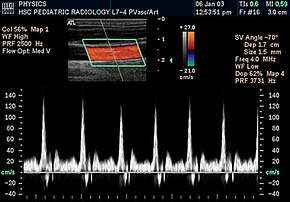Foetal cerebral redistribution
Foetal cerebral redistribution or 'brain-sparing' is a diagnosis in foetal medicine. It is characterised by preferential flow of blood towards the brain at the expense of the other vital organs, and it occurs as a haemodynamic adaptation in foetuses which have placental insufficiency. [1] The underlying mechanism is thought to be vasodilation of the cerebral arteries.[2] Cerebral redistribution is defined by the presence of a low middle cerebral artery pulsatility index (MCA-PI). Ultrasound of the middle cerebral artery to examine the Doppler waveform is used to establish this.[3] Although cerebral redistribution represents an effort to preserve brain development in the face of hypoxic stress, it is nonetheless associated with adverse neurodevelopmental outcome.[1] The presence of cerebral redistribution will be one factor taken into consideration when deciding whether to artificially deliver a baby with placental insufficiency via induction of labour or caesarian section.

Additional images

References
- Eixarch E, Meler E, Iraola A, et-al. Neurodevelopmental outcome in 2-year-old infants who were small-for-gestational-age-term fetuses with cerebral blood flow redistribution. Ultrasound Obstet Gynecol. 2008; 32(7): 894-9. PMID 19035538
- Skandhan, Avni; Knipe, Henry. "Fetal head sparing theory". Radiopaedia.
- Hershkovitz R, Kingdom JC, Geary M, Rodeck CH. Fetal cerebral blood flow redistribution in late gestation: identification of compromise in small fetuses with normal umbilical artery Doppler. Ultrasound Obstet Gynecol. 2000; 15(3): 209-12. PMID 10846776